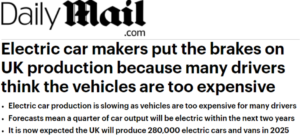The mania for mandating the use of electric cars is slowing down.
Last year, California banned the sale of gasoline-powered vehicles beginning in 2035. It may be joined by other states. But some of those bans may never be implemented as problems with EVs pile up.
EV car makers in Europe are slowing down production because the battery cars have proven too expensive for the middle class and the supply of lithium for their batteries is too uncertain. Production in Europe this year will be 12 million cars, a million less than previous estimates.
They are also not realizing the fuel savings that enviros promised. Britain’s Daily Mail reports: “Electric vehicles can be more expensive to fill up on the open road than their petrol and diesel equivalents as the cost of utilities continue to spiral.”
Then there is this assessment based on a KPMH survey of auto executives:
Of more than 900 execs surveyed internationally, 76% believe that inflation and high-interest rates will slow sales next year — and that adoption will take longer. In the U.S., the median expectation for EV sales by 2030 dropped to 35%, from 65% a year earlier. Longer-term impediments cited by the executives include the availability of raw materials for batteries, as well as stricter rules around federal incentives for buying EVs.

